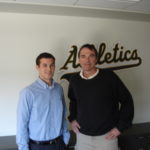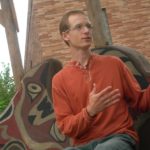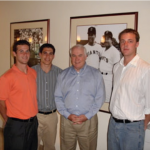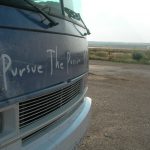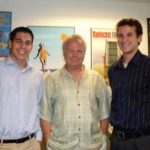Barry Moltz knows something about being an entrepreneur, and he’s happy to share in his experience. After more than one bad experience in the world of businesss, Barry has gleaned some incredibly realistic, gritty, and sensationally useful information over the years. He is, in the nature of full disclosure, one of the men responsible for the success of the Pursue the Passion tour, both in its current incarnation, and in its primordial existence in 2006.
 Barry preaches a realistic approach to life goals and planning. When he says to “downsize your dreams,” he doesn’t mean downsize them to nothing. He simply means that if you aim for the stars, you will consistently fail to achieve you goal, even if landing on the moon isn’t all that bad. Instead, aim for the moon, and come through with what you say you’re going to do. In this way, people can dream proportionately to their abilities, and never be disappointed even in their success. It is a cliché free approach to setting reasonable, attainable goals, and then growing from there.
Barry preaches a realistic approach to life goals and planning. When he says to “downsize your dreams,” he doesn’t mean downsize them to nothing. He simply means that if you aim for the stars, you will consistently fail to achieve you goal, even if landing on the moon isn’t all that bad. Instead, aim for the moon, and come through with what you say you’re going to do. In this way, people can dream proportionately to their abilities, and never be disappointed even in their success. It is a cliché free approach to setting reasonable, attainable goals, and then growing from there.
Make sure to look out for Barry’s latest book, Bounce: Failure,
Resiliency and Confidence to Achieve Your Next Great Success, which will be in bookstores in January 2008.
INTERVIEW
The interview was conducted in the Moltz family home in the suburbs of Chicago. Barry’s 14 year old son Ethan performed magic tricks at the dinner table, while his younger brother Daniel plotted entrepreneurial schemes during the interview. Barry Moltz donned a blue Nomar Garciaparra Cubs Jersey during the interview in the living room. We all got a personal massage downstairs by JoAnne Pavin, a former client of Barry’s and a PTP interviewee. We had dinner with ten people at the table- Meghan Hoover, the massuse, the four of us, and the four Moltz’s.
You’re coming out with this new book called Bounce. You’re taking a few stances that aren’t in books on shelves. Like you can’t learn from failures?
It’s not that you can’t learn from your failures, it’s that you always can’t learn something from your failures. What we do is we make ourselves feel better when we fail to say it was a learning experience.
Sometimes you learn things, sometimes you don’t learn things. It’s just another outcome. I think that if we wouldn’t treat it with as much severity as a ‘failure,’ versus ‘this was a success,’ we just look at it as another outcome. And then go on to the following outcome and the next outcome. I think we have too much attached to failure. And then we always have to learn from it so we can make ourselves feel better.
Sometimes there is something to learn. A lot of times there’s not.
So what have you learned from your failures in business because I know that’s a main part of your speech when you deliver that to audiences.
The first thing I learned was there wasn’t always something to learn. A lot of times I was always looking for, ‘Okay. I’m supposed to learn something. What am I supposed to learn?’ And there wasn’t anything there.
But sometimes you do learn things. One of the biggest things I learned in my second business when I got kicked out of business by my two partners was just how important people in business is. Businesses are not about ideas, or execution of those ideas. Without execution, they’re only about people. Who you’re doing it with, is so much more important than what you’re doing.
In my third business, I hooked up with a guy where we were selling technical software. That was really boring. But the guy I was doing it with was really cool. I think that’s why we were successful. We were able to work together. So who you’re doing it with is so much more important than what you’re doing.
In our travels, there’s been a lot of people who have ventured off on an idea because they believe it in so much, and a lot of the outside people, like friends, family, teachers, really look upon that action as being crazy. Do you have to be crazy to actually pursue your passion?
Well here’s the thing. It depends on what you mean by crazy. We have two definitions. One is someone who is someone who is really insane and demented and institutionalized. Crazy can also be someone who is enthusiastic, passionate, to have fire inside of you.
But if you think about it, from an economic standpoint, it makes absolutely no sense. If you look at the economic risk an entrepreneur takes, they’re risking way too much for the return they might get.
I always talk about the statistics that 550,000 businesses every year get started in the United States, and 500,000 businesses go out of business every year in the United States. You have about a twenty percent chance of being in business after five years. So it is nuts!
The good part is that we don’t measure it like that. Most people do it because they’re passionate. Because they can help themselves. I say that I’m an entrepreneurholic, that I want to see my ideas succeed or fail. I don’t have any choice but to go out and create these things. That’s why we do it. We don’t measure the risk.
So we talked a little bit tonight about the socioeconomic aspect of actually going out and following your dreams. What’s your take on that. Can you do it if you are in the lower income bracket? Like actually go out and realize something. Or do you have to go out and get a job that you despise and put your head down and put the blinders on?
I think that we can’t always frame pursuing passion as economics. As something that we do for work. There may be people out there who have a job that perhaps they’re not so excited about, that they’re bored by, or they do it just for the money. I think what’s important for those people, who aren’t fortunate enough to pursue their passion and make money at it, is to find something in their lives that they’re passionate about. Maybe their passionate about their family. Maybe they’re passionate about the Cubbies. Maybe their passionate about doing woodworking like my father is. I think there has to be something inside of yourself that can drive you someplace where you can get the energy recharged. Perhaps, you don’t have a choice. Maybe you have to do that job stacking shelves at Walmart. Not that there is anything wrong with that, but maybe there isn’t passion associated with that. You have to find passion in other parts of your life.
So we talked a little about, we flirted with the idea of a Passion Award, and our main thing is how do you measure passion. How would you measure it?
I don’t know. Maybe that’s why we didn’t come out with a Passion Award.
One of the things I liked that we talked about tonight was that sometimes people buy into the stereotypical thing of ‘what is passion?’ It’s the fire, it’s this. A lot of people are really not passionate. They’re really just bored in their jobs, or bored in their lives. And they’re trying to convince themselves that they’re passionate. So perhaps, is the guy that’s making paella, the guy who has been able to make a fully integrated life for himself.
One of the things that I always talk to people about is that we continually told we have to separate our personal life from our business life. I don’t think that’s true. We have to merge it together to make one life.
To me, that’s where passion really lies. Is when you merge together your personal life and your business life to have one whole thing. And maybe that’s the way that we should, I don’t want to use the word judge, but celebrate the person that really have made a whole life for themselves. Which is something that I think all of us strive for.
And that’s exactly what you’ve done. You’ve been fortunate enough to incorporate that full circle. But on the contrary, we also talked about one of your clients who has been struggling for the past two years after a divorce and is pretty much at the bottom. What was your bottom and what were you thinking and what kept you going at that point?
I would say that there were a couple of different bottoms. We talked about in the first book, how in 1995 when I got diabetes, I started suffering from depression, panic disorder, anxiety. I wasn’t very effective running my business so that was pretty much towards the bottom.
There are many times when I was running a lot of my businesses where I didn’t think economically we could go on. But sometimes, you do find a way to keep going. And what keeps you going in that direction? Sometimes, only inertia. And for many of us, that is problematic. There’s this expression in our society that quitters never win, and winners never quit. But really, it’s the winners that know when to quit. And that’s why I try to guide people in that.
I think if you have a vision, I think if you can find an economic way to keep going, whenever you keep going, there’s another opportunity for success.
One of the best parts about having your own business, if you have a bad day, you go to bed at night, you wake up the next morning, you get another chance to succeed. That’s why one of my taglines in the second book is “Failure. Resiliency. And the Confidence for your next great success.” It’s not necessarily linear, but there’s always choices. There’s always other opportunities.
I think that when things are going really badly, you try to look at the other choices. There’s other directions that you can go. There’s many businesses that started doing one thing, and they morph into doing something totally different.
For example, I believe eBay started doing auction software. And then they decided that they wanted to do auctions. So however you start out, isn’t always the way things end out. Sometimes, this leads to this that leads to this. And that’s ok. Keep finding a way through. That’s what I think really keeps it going.
Resiliency I believe, probably even more than passion, we should call it the Pursue the Resiliency Tour…whaddya think? Resiliency, even more than passion, is important because one thing that I realized is, no matter what happens to the business, you’ll have your family, and you’ll never go hungry. I can always go out and get that job and earn enough money where my family will never be on the street and will never go hungry.
I think that’s a reassuring thing. As my lawyer used to say to me, ‘What’s the worst they can do? Eat you? That’s illegal.’
So a lot of times you get another chance. And American society, fortunately, is very forgiving like that. They do give second chances. And third chances and fourth chances.
Is there any shortcomings or disservices American society puts on people?
I think there’s a lot. I think that the American Dream, is that if we work hard enough, if we’re smart enough, that we’re going to get there. We’re going to be almost guaranteed financial return. And it just doesn’t work that way. Most of us don’t quite get to the pot of gold at the end of the rainbow. That’s why I tell people we have to downsize our dreams.
We have to figure out what success means to us. Not what our parents told us. A lot of our parents told us that we should become an accountant, a lawyer, or a doctor. Let’s figure out what success mean for ourselves.
Certainly it’s about money. I want to make money just like everyone else. But if we never get to that pot of gold, it can’t only be about money. I tell people that we have to set a money plus goal. I think that you need to think about your own goals. What does success mean to you is really important.
Success isn’t just money. It can’t be just measured in that. Let’s not buy into everyone else’s dreams. So I think that’s one of the disservices we do.
Another of the disservices is that there’s always something to learn from failure. It’s the way that we make ourselves feel better.
What’s success to you?
It’s a really good question. I think success is being able to earn a living by doing what you really enjoy. To me, that’s success. Success is being able to feed your children. Success is being able to live in a place that you’re comfortable. Success is being able to constantly learn from people that you meet every single day. Success is finding your place in this world where you feel that you can make a contribution.
As a motivational speaker now, as a family business consultant, I feel for a day, a week, forty-five minutes, I’ve made some kind of difference in people’s lives. Even if they only take a break from what they’re currently doing, maybe they look at things a little bit differently.
If you can find where you fit in this world, what your contribution is, I think that’s really what success is.
Is there one person that you’d like to meet?
Wow. I think I would really like to meet my wife’s father who was killed in a car accident twenty years ago. While I didn’t have the opportunity to meet her father, I got cheated out of learning a whole aspect of who she was, and where she came from. I think I’d also like to meet more of my ancestors. About how did I get here. Because I really do believe that we’re products of the people who came before us. And unfortunately, in our society, a lot of that oral history and who you are, really gets lost.
So what’s the one question if you could go back ask one of ancestors?
Why did we come to America? Because I always really wondered why would people leave where they were. What drives them to leave where they were, and come to a place where you don’t know the language, you don’t know anybody. I think that takes a lot of courage. And I really want to understand that courage.
I believe I’m only here, and I only have the opportunity, because of what they did before me.
A lot of people are not as fortunate to have an opportunity like I did. That expression, ‘There go I, but for the…’ What is it? Noah what is it?
Noah: I don’t know.
‘There go I, but for the grace of God.’ I wouldn’t be here unless it was happenstance. And that’s what I also reject from other people. Because people say, ‘Well, I’m here and I’m as financially successful as I am because I earned it. I worked hard. I went to college.’ I go, ‘Well guess what? You had a chance to go to college. You lived in a place where you weren’t surrounded by drug dealers and negative influences. You had that opportunity. You had the opportunity to go out for three months, in an RV, and learn what people can teach you.’ A lot of people don’t have that kind of opportunity. It’s only my ancestors and the people that came before me that gave me that opportunity that I could really be where I am today.
So how do those people without the opportunity turn the tables and shift luck in their favor?
I think it’s hard. I think you have to look for a way out. I think you’ve got to look for a crack. You have to look to connect or find someone who will take a personal interest in who you are, and maybe show you a path to escape, or to shift slightly to the left or right or whatever it is.
Remember, when you grow in your life, you really change that for all the people who come after you. There’s a program in Chicago I was involved in for a long time called Icy Stars. We took young adults, 20’s and early 30’s who had minimum wage jobs in the inner city who desired to learn a technical trade. We taught them how to be programmers and web masters. And then we placed them at jobs for thirty or forty thousand dollars a year at major corporations.
This changed their lives, and it not only changed their lives, but it changed their kids lives. It changed every one that’s going to come after them so that whole cycle of poverty really changes. And what better thing to train someone to give them a better job to end all that other kinds of bad, economic stuff and crime that goes along with poverty.
Noah: I want to hear what your five steps to success are.
What’s the five steps to success? Noah, that’s really the problem. Because I believe that one of the reasons people will want to watch a Pursue the Passion video is because they’re looking for the secret. They’re looking for the key. And I think that if we give up the idea, that there is no one universal secret, there is no one universal key, that really opens us up to actually finding what fits for us.
By not having a five steps to success, it really enables us to have our own formula for whatever that really means to us. Obviously, in addition to, whatever financial success you’re seeking.
That’s something you found as you’ve traveled half the globe. In talking to your audiences, you’ve found that people often are looking for you to tell them that answer instead of them seeking it in themselves.
It’s sad. I believe people are hungry for information. They’re hungry for success. But they’re not willing to work on it and explore to find where success is really right for them.
They want someone to say, ‘If I only do the five things that Donald Trump did, then I’ll be successful.’ Step one, get a father that gave you fifty million dollars. If we all do that, I think we’ll have a chance regardless of what the next four things are going to be.
I always laugh that, of course I never read Stuff Magazine, but in that magazine they had a picture of Ivanka Trump on the cover. The caption was, “How to Get Rich, By Ivanka Trump.” And I thought that the first sentence should be, “Have Donald as your father.”
So people want to know what are the five steps. People are hungry for that. The biggest best seller in 2007 was The Secret. Just by it’s very name, people want to know what’s the secret. And the fact is, that there is no secret. The sooner we’re wiling to accept that, but you see, we don’t want to accept that, because most of us want to find a shortcut. Most of us would rather win the lottery than work hard. We want to be able to cheat our way. We want to find the magic so we don’t have to go through all those other steps. And really be forced to deal with all the unexpected things with good luck and bad luck.
I think we gotta give that up. The sooner we give that up, we can do our own search. Kind of like what you guys are finding.
That’s a good answer.
You know there is no pot of gold at the end of the rainbow. My family last year, we did the bring climb in Sydney, Australia. Where you actually climb from the base of the bridge all the way to the top. We actually saw a 270 degree rainbow when we got to the top of that bridge. And you know something? There was no pot of gold at the end of that 270 degree rainbow. There was just a beautiful view with your family. And maybe that’s what it’s about.
If you could back to when you were 22 years old, and offer yourself one piece of advice, what would you say to the 22 year old Barry?
I would say don’t be in such a rush to figure out what to do with the rest of your life. There’s a lot of pressure put on kids. I’m just now turning 47, and I’m deciding what I want to be when I grow up. I would say to take it slow. Take each experience as it comes. Don’t plan your career more than a year in advance, and see what happens. See what people you meet. Take advantage of those opportunities.
Life is not linear. My mother told me that every year I would make more money, every year I would get promoted. Careers and lives are much more up and down. You have to be comfortable with that. Take your time. Go slow. Downsize your dreams. Strive for minimal achievement.
Hopefully that was a little different crap than all the other crap you guys have heard.
(A couple things-
- The angle you would take on this piece would be to focus on what success means. Through out the five steps to success. Stop looking for a secret. The real success is not a pot of gold, because that rarely comes. It’s just a beautiful view with your family.
- Putting some importance on the spirit of America. This is a country built on people who pursued a better life. Our ancestors left the comfort of their lives to pursue a better opportunity in a foreign land where they did not know what to expect. They’d heard of what it was like. But they didn’t know for certain. That’s what this is about. It’s about four guys who traveled around the country, the country where people still faithfully come to better their lives, and to better the lives of the others who will follow. It’s very cool that this road trip took place in America, because this is the country where stories and stuff like this are possible.

